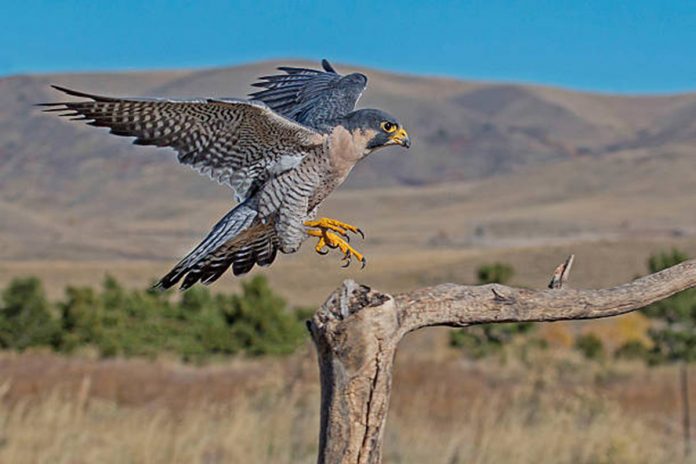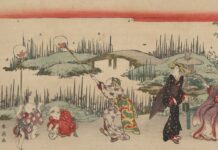Translated from Macedonian by Elizabeta Bakovska
The delivery of the last falcon for the sultan was late for almost three full years. Although Davidov, limping and blind in one eye, was a well-known falconer, nesting expert and flying teacher, this time the bird wouldn’t listen to him at all. Nothing was of help, not even the fact that he was the most skilful raptor nest seeker in the Balkans. In short, he was a supreme professional, an eccentric and a miracle worker. Even his dreams were full of flutters, landings, dives and spins. He too was spinning in his bed like a falcon. He was looking for salvation in love, so while waiting for the new delivery, he publicly, in front of the young and unskilled hatchlings, made wild love to the women who came in secret to reveal his talent for training, healing and hypnosis. Underneath him, as dried violets, lay hundreds of women’s hearts. Nevertheless, now cuddled up in his wicker rocking chair, he would say that only one of them succeeded in opening his secret chest with a golden key in the bosom:
“Her name was Sevdalina, her hair was red and her eyes were half green, half grey – real Balkan eyes. And you know what, falcon my child, she was obedient, she respected me! With women – Davidov used to say while blowing gently into the falcon – you should never talk to them as to a man. They never think the way we do! And you must never flatter them; falcon my child, Siljan, your naughty child. Get it! Never! Courtship the anticipation of receiving the answer that you would offer, and you should know that they could never think the same way as you! They are women, Davidov used to say, throwing the falcon like a stone and whistling lightly to get it to consent to make five or six circles above the chestnut. Exhausted by the circular cursing of the bird that persistently flew only below the lower branches of the chestnut, he would fall asleep in his wicker rocking chair like a baby. Later, the falcon would land on his shoulder and clean his ear with the beak. That lazy bird never wanted to rise above the chestnut. And the Sultan had already sent his word: if the bird that would lead him to new imperial victories doesn’t arrive in two weeks, then, on Saint George’s day, he would demand Davidov’s head to be brought to him in Istanbul. There were only two more days until the day written in the ledger, and the falcon would in no way listen to the trainer’s orders. On the contrary, it wouldn’t rise higher than the chestnut at all, higher than the poplars in the park; it wouldn’t fly on its back, in circles, wouldn’t plunge, fly in high altitudes, fly for the purposes of meteorology, spying or hunting; it wouldn’t glide, pitch and play dead while soaring in the sky. All it ever wanted was to play, to pick the ear, the left eye of the trainer, and that was all.
And before this one, all the other birds that would head off from Davidov’s backyard would arrive in Istanbul on time. As soon as he would confirm that the falcon is able to find the way across the winds alone, the trainer would climb up on the chestnut and from there he would wave his straw hat until the bird would vanish in the clouds above the city. After five days of flying, twice faster than the carriers who kept taking the same route, the falcon would arrive in Istanbul, right on the porch of the church “Hagia Sophia”. Sexton Timotej, paid to do that, would read the address written on the ring made of zinc attached to the falcon’s left leg, and would take the worn-out bird to the owner’s house, most often to the Sultan’s summer palace. There, in the house of the owner, for a whole week they would bathe it with scented water to cover the air of smoke, ashes, mutinies and uprisings gathered on the way during the difficult flight over the Balkan.
Unfortunately, this falcon, although prettiest of all found in the valley, did not want to leave. For the first time the training wouldn’t work. The descendent of the Kumans who went astray in Macedonia, Master Davidov, was leafing through all the specialist books; he read all the known experiences; he tried all the known and unknown magic, all in vain. The bird was calmly standing on his shoulder, pecking the moon with the beak and throwing yellow moonbits in the book that the trainer was leafing through in his lap. Possibly because he was neglected, the falcon was furiously tearing the moon apart and the moon was screaming like a hatchling, while Davidov was reading aloud the memoirs of Marco Polo about Kublai Khan, who used to take on his hunt ten thousand falconers and five hundred falcons: “It is terrifying, falcon my dear, for the sun to be fenced in with wings, with a veil of wings, falcon my dear, for the sky to be darkened with beaks, oh my Siljan, nervously screamed Davidov, and the falcon was fluttering the wings and ripping the moon even more fiercely. The people of Dubrovnik, falcon my dear, had so many trained birds, that they sold them even to their enemies without any prejudice! They made a lot of money from the enemies, my dear falcon! A lot of money! Their fast, sophisticated and obedient birds were wanted even in Venice, Bari and Palermo, and from Palermo, they were sold in Bosnia, France, England and Germany for even more money. Berlin was full of trained birds, falcon my dear! During the hunting season, falcon my dear, for naïve nations, my child, Europe had hundreds of excellent Balkan birds for tactical deception. With them, my dear falcon, they could find anything, promise everything and do nothing on time!”
Later, when the moon was completely torn apart, the angry Davidov was groaning and ripping out the piles of old books, documents, scrolls, parchments. He was ripping and eating them, and finally he reached the hagiography of Saint Cyril, brother of Saint Methodius and founder of the Slavic orthodox alphabet. The small birds, already awake in the eaves and barn joists, were sleepily wallowing in the husky voice of Davidov, who even at dawn continued to read, to devise something while quite seriously threatening the falcon who started to act up with the wing and to hide the letters and the sun from Davidov.
When Saint Cyril was a young man, falcon, my dear child, enemy of mine, he had one very bright falcon, son of a bitch! The bird knew how to clean the eyes of the saints with the wings, to compose trial alphabets with wooden letters; knew how to put out the burnt candles, to carry the icon lamp, to pour water for him to wash after a prayer, to scratch him on the neck so he would not fall asleep writing his hagiographies and sermons in the dead of night. It even knew how to toll a bell; one for a funeral, another for Saint’s day, you ruffian, bird, my naughty child! Unfortunately, one day, friend of the other, enemy of mine, one day, when the saint hunted down a partridge in the fields near Thessaloniki, a terrible whirlwind arose, carrying the falcon in the clouds. For two years Saint Cyril mourned terribly, postponed the alphabet and his mission in Moravia, he looked for his falcon across all Macedonian and Greek provinces, but there was neither a trace of the falcon, nor a feather. At the end of the second year, a falconer from Russia brought an eyas with similar feathers on the tail and on the neck, but that Russian eyas never became a falcon as the one that the whirlwind had carried away. Later, after the Moravian mission, Cyril, together with Methodius, reached even Rome in search for his falcon. Unfortunately, child, enemy of mine, instead of his falcon, instead of it, in a nest of sorrow he found his own death. They say that during strong whirlwinds, on his grave in Rome a falcon with thyme in its beak descends, but I don’t believe those stories my child, my hatchling, my naughty wilderness! A good falcon never carries flowers in the beak! Even you wouldn’t do that, would you? You wouldn’t, Siljan, right? Reach your destination, and then you can become human for all I care, you wilderness, you naughty wild child!”
The falcon was completely exhausted by now, it was napping shriveled by the trainer‘s neck. It finished its nap, perked up, jumped in his lap and then, as it was waddling in a drunken manner, Davidov spattered it with thyme tea and blew in its beak. And then the bird, running from the chair to the chestnut and lifting the leg feathers as it would lift a pair of baggy trousers, took off the ground and made one brief low circular flight in the backyard. It made the next circle above the house, and the third lifted it up as high as the poplars in the park. The wind that blew down the wild chestnut street lifted it up above the chimneys, and then, after spinning it a couple of times in the jar with houses on the bottom, ascended it in the clouds, and the falcon could not be seen from the backyard anymore. A few hours passed, the wind calmed, but it was still gone. When Davidov thought that it decided to go to Istanbul at last, the little falcon appeared above the chestnut and descended sharply into the lap of his old, blind and respectable trainer. It fluttered its wings, screeched once, screeched once more like a jackdaw, and it laid down pink panties in next to Davidov’s feet. It pecked him on the chin, tickled his nose with its tail and it lifted up in the sky again. Soon, from high above, it dropped a brassier with little bells, a few freshly scoured women’s vests, and socks with and without butterflies, flaxen girdles, and chastity belts with and without a lock, a dozen pairs of black bathing suits, and myriads of different scents. All night long Davidov was dying of shame, and of worry. With his hands he was trying to get the crazy bird down from the grapevine, but it didn’t want to go down. It was making spins and dives above the yard, running away and coming back, and in that manner, from high above, it was dropping brassieres, renaissance corsets and nightgowns, different women’s dreams that still carried the scent of innocence. Very soon, Davidov’s yard was covered with colorful women’s panties. There were some with lace and lacings, with roses and dots, with long legs and without, perforated on the right and with a triangle upfront, with a leaf behind and without a garter upward. Some were made of silk, cotton, wool, and some of them were quite unique – fishnet panties made from jute and cotton.
Before the break of dawn, the whole yard of Davidov was covered with scented underwear, with sighs, with women’s hearts dried as violets, with scents that evaporated together with the night dew in the chestnut. A wonderfully colorful winter was reigning in the yard; everything was buried in women’s snowdrifts! When the sun rolled over from the roof of the city hall, Davidov couldn’t get up from the rocking chair anymore – he sat tired, almost without breath, up to his neck in brassieres and panties. And then, that morning, the Sultan’s messenger from Istanbul, while pushing piles of women’s underwear with his chest, somehow managed to arrive to the place where he supposed the old trainer, the eccentric and the miracle worker would be sitting. With a glistening shaved head he was searching with his saber through the pink panties and at the very end he discovered the face of Davidov. Cuddled up in his rocking chair, he was facing the sky and in his eyes a new spring was blossoming. The messenger lifted his saber, stroke, and the next moment the head of Davidov started to smell of thyme.
About the author:
Blaze Minevski (1961, Macedonia) is the author of the novels “Me, Lenin and Mickey Mouse”, “We Should Have Taken a Photo before We Started Hating Each Other”, ”A Story about a Third Party, “The Mark” and ”The Performers”. The novel ” The Mark” in 2007 won the award “Stale Popov” for the best book of prose, given by the Macedonian Writers’ Society, the award “Novel of the year” given by the newspaper ‟Utrinski Vesnik” and the award ”13th of November” given by the City of Skopje.















